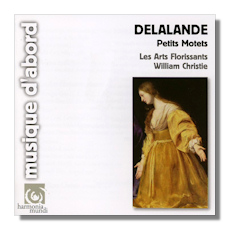
The Internet's Premier Classical Music Source
Related Links
- Delalande Reviews
- Latest Reviews
- More Reviews
-
By Composer
-
Collections
DVD & Blu-ray
Books
Concert Reviews
Articles/Interviews
Software
Audio
Search Amazon
Recommended Links
Site News
 CD Review
CD Review
Michel-Richard Delalande

Petits Motets
- Michel-Richard Delalande:
- Miserere à voix seule, S. 87
- Vanum est vobis ante lucem
- Miserator et misericors
- Cantique quatrième "Sur le bonnheur des justes"
- Louis Lemaire: Assumpta est Maria
- Jean-Baptiste Morin: Regina coeli
Les Arts Florissants/William Christie
Harmonia Mundi musique d'abord HMA1951416
Reissue of HMC901416: Amazon - UK - Germany - Canada - France - Japan
It was Henry Dumont in 1652 who effectively invented a new musico-liturgical form. In the court of Louis XIV the Petits Motets were originally sung by the "Chapelle Musique" towards the end of the Mass, at the Elevation between a longer motet and the Domine salvum fac Regem. Eventually they evolved into more substantial sacred cantatas in their own right. Arias and recitatives were added… a nod in the Italian direction.
True, Delalande's more substantial motets are better known than the pieces we hear on this enjoyable CD from Les Arts Florissants under William Christie (who also plays the organ) on Harmonia Mundi's Musique d'abord label. But here are nearly 70 minutes (20 items) of intense, focused, warm and rich motets by one of the genre's greatest exponents – certainly the greatest French composer in the form of the late seventeenth and early eighteenth centuries. Two pieces for comparison by Louis Lemaire (Assumpta est Maria) and Jean-Baptiste Morin (Regina coeli) also presented. Indeed, the latter is the longest work on this CD at almost ten and a half minutes. So, while there's little or no structure, no attempt to recreate a service or sequence, the music on this CD is of a kind, concentrated and very pleasing to the ear.
For the most part Delalande's Petits Motets are actually based on the recits of his larger such works, only embellished and expanded for performance by soprano, continuo and organ ritornelli (which are reductions of the Grands Motets orchestral parts). They set two psalms with movements contrasting usually in tempo and tone, and sometimes in key. Each one is self-contained and has its own logic, which is amply and stylishly observed by Christie and Les Arts.
The Petits Motets remain, though, akin to chamber size, though hardly miniatures: there is drama, emotion, progression, wisdom (in the way the texts are approached, for example); there is much opportunity for Delalande to display his devotional strength and provide for the singers, if not virtuoso opportunities, then certainly melodies and timbres which will attract the ear for its quiet accomplishment. The two best known sopranos, who more than live up to the gentle yet uncompromising music here, are Véronique Gens and Sandrine Piau. They are joined by Noémie Rime and Arlette Steyer. Those from Les Arts Florissants are few: a continuo of just four; the choir has no more than seven – all sopranos.
After immersing oneself in this lovely music as the very different worlds of these half dozen works are subtly revealed, one is left feeling that the performers too must have enjoyed the particular warmth and chiaroscuro atmosphere which its composer(s) created. Christie and his forces have not varnished it; nor have they stopped short of shining quite penetrating lights onto then into it. If one feels, perhaps, that its darkest corners remain still just a little mysterious, that's no failing: this is intricate and mutli-layered music that will repay frequent listening. There can be few better groups of musicians enable us to do that.
The acoustic is good, if a little dry. The booklet contains a useful background essay and has the texts in French, English and German as well as Latin. If mid-Baroque sacred choral music sung and performed on a small scale with great style and conviction could potentially satisfy you – either as a newcomer or someone already familiar with its characteristics – then this reissue from almost 20 years ago will not disappoint.
Copyright © 2010, Mark Sealey.




















